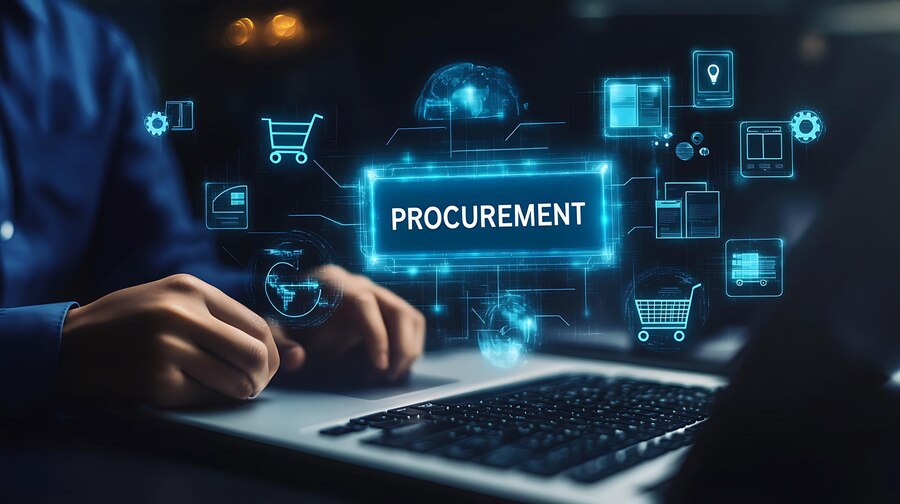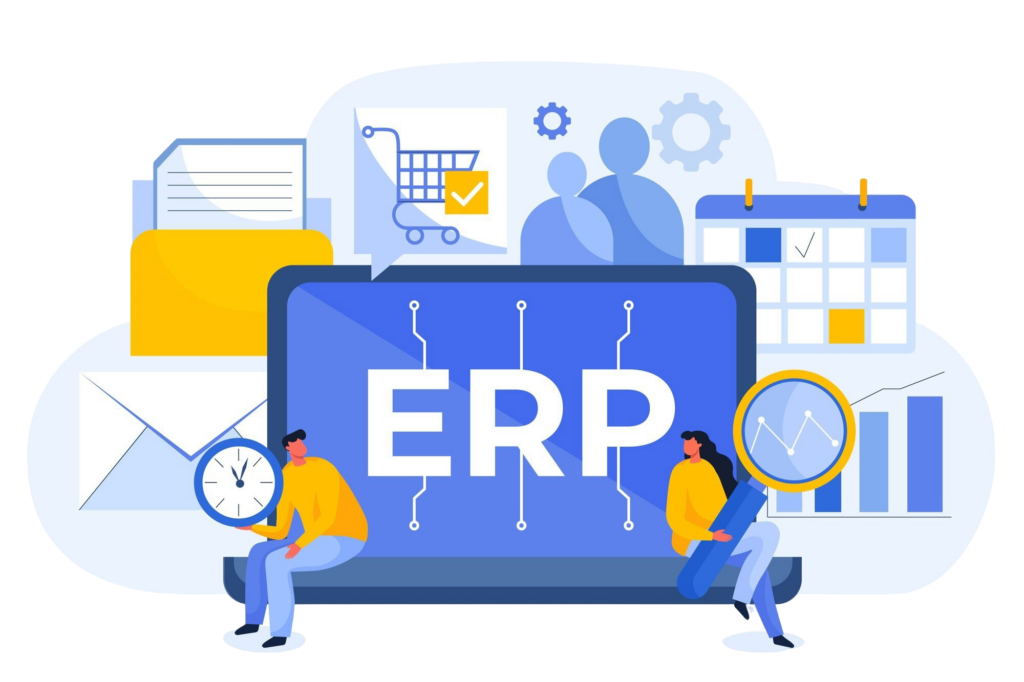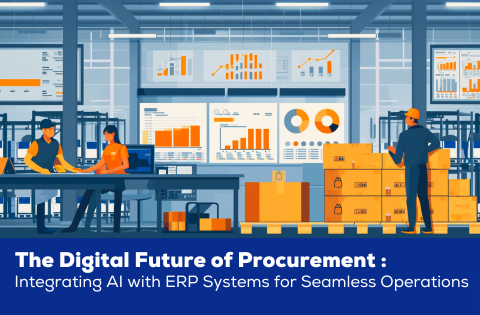
Ready to see how this integration can transform your workflow?
Let’s explore the game-changing benefits.
Introduction:
Enterprise Resource Planning (ERP) systems have been a fundamental pillar in managing large-scale businesses, seamlessly integrating core processes like finance, supply chain, HR, and customer relations. In today’s fast-paced digital world, these systems are being transformed by the integration of Artificial Intelligence (AI). This game-changing combination empowers businesses with advanced automation, smarter decision-making, and enhanced predictive insights, helping organizations unlock new levels of productivity and efficiency. With AI-driven ERP, your business is better equipped to stay ahead of the curve and adapt to the demands of an ever-evolving marketplace.
Ready to optimize your business?
Let’s explore what ERP is and how it can benefit your organization.

What is ERP? A Definition:
Before exploring AI integration, it’s essential to understand the essence of ERP systems. An ERP is a centralized platform designed to streamline and unify key business processes. It automates tasks and ensures seamless integration across various functions, including:
- Financial Management: Simplifies accounting, budgeting, and cash flow management to provide clear financial oversight.
- Supply Chain Management: Enables real-time tracking of materials, production, and distribution for streamlined operations.
- Human Resources (HR): Facilitates employee management, payroll processing, and training to nurture your workforce.
- Customer Relationship Management (CRM): Drives sales, strengthens customer engagement, and enhances service delivery.
- Manufacturing and Production: Oversees the entire lifecycle, from planning to delivery, ensuring efficiency at every step.
ERP systems are built to simplify operations, minimize human error, and boost productivity. Yet, traditional ERPs often depend on fixed rules and workflows, making them less adaptable to evolving data patterns or unexpected challenges. This is where AI transforms the game.
Ready to elevate your business with AI?
Here’s why integrating AI with ERP can transform your business.
Why You Should Integrate AI with ERP Systems?
AI takes ERP systems beyond basic process automation, transforming them into hubs of intelligent automation. Integrating AI into ERP systems offers several key benefits:
- Advanced Data Processing and Analysis:
AI enables ERP systems to process massive amounts of structured and unstructured data. For your organization, this means gaining real-time insights across departments to support smarter decision-making, more accurate forecasting, and efficient planning.
- Predictive Analytics:
With AI-powered predictive capabilities, ERP systems can identify trends, anticipate equipment maintenance, address supply chain issues, or forecast demand fluctuations. Machine learning models analyze historical data to suggest proactive actions, helping you stay ahead of potential challenges.
- Automating Routine Tasks:
AI bots take over repetitive tasks such as report generation, invoice management, or payroll processing, giving your team more time to focus on strategic initiatives and driving growth.
- Enhanced Accuracy in Demand Forecasting:
AI algorithms, especially machine learning, excel at demand forecasting. This ensures better inventory management, reduced costs, and minimized waste by keeping the right products available when and where they’re needed.
- Improved Decision Support:
AI boosts strategic decision-making by delivering actionable insights from real-time data analysis. Whether in procurement, finance, or HR, AI-driven ERP systems recommend the best actions based on predictive analytics and historical trends, empowering confident choices.
- Personalized User Experience:
AI customizes ERP interfaces and workflows based on user preferences, creating a customized and intuitive experience. This personalization improves productivity and ensures a more satisfying work environment for your employees.
Discover how AI can transform your ERP functions!
Here’s how AI is revolutionizing key ERP processes
How AI Redefines Key ERP Functions:
Let’s explore how AI elevates core ERP functions:
- Finance & Accounting: AI-driven ERPs can simplify and enhance the accuracy of your finance operations, ensuring smoother financial management and more reliable insights for your organization.
- Automated invoice processing: AI bots can efficiently manage incoming invoices, categorize them, and flag discrepancies, accelerating your approval process and reducing human error.
- Detecting Fraud: AI systems can analyze transaction patterns within your business to detect potential fraud, alerting your team before issues escalate.
- Predictive financial analysis: AI-driven analytics help your organization predict financial risks, enabling you to adjust strategies in real-time and stay ahead of potential challenges.
- Supply Chain Management: AI can revolutionize your supply chain operations by delivering:
- Streamlined inventory management: Machine learning models help forecast demand with greater accuracy, ensuring your business maintains the ideal inventory levels without overstocking or stockouts.
- Predictive maintenance: AI analyzes equipment data to predict when maintenance is needed, reducing downtime and keeping your operations running smoothly.
- Supplier risk management: AI can assess external factors like weather patterns or political risks to foresee potential disruptions in your supply chain, helping you proactively mitigate risks.
- Human Resources (HR): AI plays a transformative role in your HR processes, enhancing efficiency and decision-making across various functions:
- Talent acquisition: AI-driven tools can efficiently scan resumes, match them with job descriptions, and recommend the best candidates for interviews, making your hiring process faster and more accurate.
- Retaining Employees: By analyzing employee sentiment, AI helps identify potential turnover risks and suggests strategies to keep your top talent engaged and committed.
- Performance monitoring: AI systems continuously monitor employee performance, providing personalized development plans to nurture growth and enhance productivity within your team.
- Customer Relationship Management (CRM): AI enhances your customer interactions by delivering personalized, efficient, and responsive experiences across all touchpoints:
- Sales forecasting: AI models analyze customer behavior and past performance to predict future sales trends, helping your business make data-driven decisions and plan for growth.
- Customer service automation: AI-powered chatbots efficiently handle routine inquiries, allowing your human agents to focus on more complex customer needs and elevate service quality.
- Customized Marketing Approaches: AI customizes marketing campaigns to individual preferences, boosting customer engagement and driving higher conversion rates for your business.
Ready to tackle the challenges of AI-ERP integration?
But before you dive in, let’s take a look at some obstacles you might face
Obstacles in AI-ERP Integration:
Although there are numerous benefits, integrating AI with your ERP system does come with its own set of challenges that require careful consideration:
- Data Quality: AI systems rely on the quality of the data they process. For your organization, poor-quality data can lead to inaccurate predictions and suboptimal decisions, impacting overall efficiency.
- Costs of Implementation: Integrating AI into your existing ERP system can be costly, especially for smaller businesses with limited budgets, but the long-term benefits often outweigh the initial investment.
- Data Security: As AI-powered systems handle sensitive information, it’s crucial for your organization to implement robust security measures to safeguard against potential data breaches.
- User Training: AI-enhanced ERPs may introduce new workflows that require your team to undergo training, ensuring they adapt to the changes and make the most of the advanced system features.
Curious about what’s next for AI-ERP integration?
Let’s explore the exciting developments in this space
The Next Phase Of AI-ERP Integration:
AI and ERP integration is continuously evolving, and future advancements promise even more powerful capabilities that will further streamline operations and drive innovation within your organization:
- Hyper-automation: AI and machine learning will automate even more complex tasks within your organization, paving the way for fully autonomous business processes that improve efficiency and reduce manual effort.
- Natural Language Processing (NLP): AI’s ability to understand and interpret human language will make interacting with your ERP system more intuitive. Employees could simply ask for insights, and the system would respond in natural, conversational language, simplifying data access.
- AI-Driven Decision-Making: As AI systems evolve, they will take on more advanced decision-making responsibilities, allowing your team to focus on creative and strategic initiatives while AI handles routine, high-level choices.
Ready to take your ERP system to the next level with AI?
Here’s a quick recap of how AI can drive transformation
Conclusion:
The integration of AI into your ERP system is transforming the way your business operates. By improving data analysis, automating routine tasks, and providing predictive insights, AI is making your ERP system smarter, more adaptable, and efficient. As technology continues to advance, embracing AI-driven ERP solutions will give your organization a considerable competitive edge in your industry, positioning you for future success.
Let’s clear them up
Q&A:
- Why would an organization need to Integrate an ERP?
ERP integration keeps your data consistent across platforms, reducing discrepancies and ensuring accurate, reliable information for better decision-making and process integrity.
- What is the Full Form Of ERP?
ERP stands for Enterprise Resource Planning. It’s the software system that equips your business with the tools to manage HR, manufacturing, supply chain, finance, accounting, and more.
